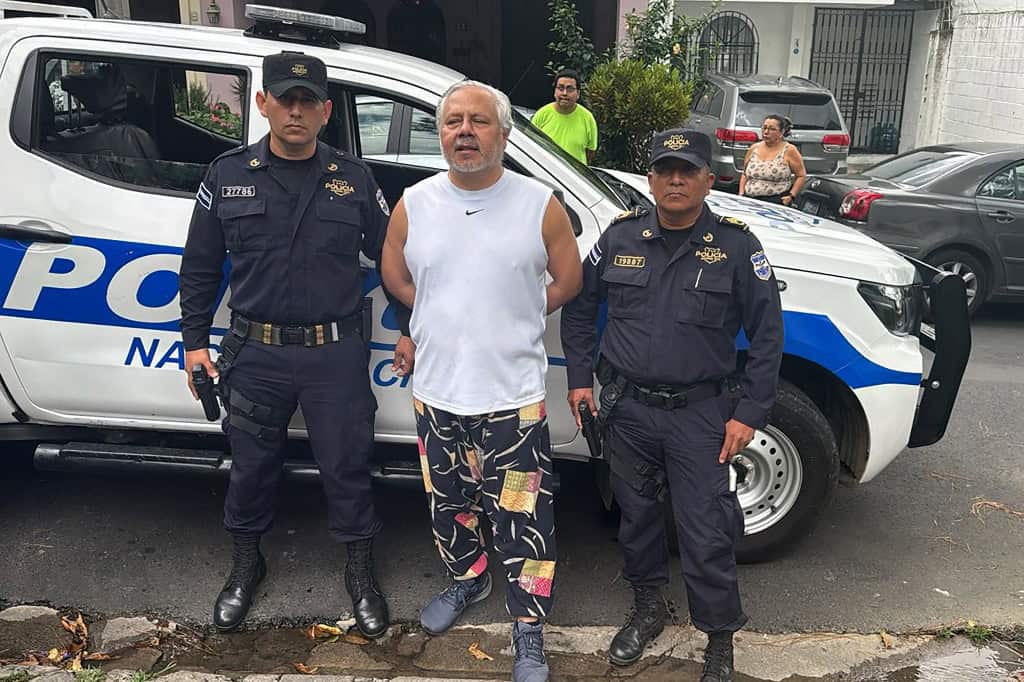Salvadoran constitutional lawyer Enrique Anaya, a staunch critic of President Nayib Bukele, was arrested Saturday on charges of money laundering, according to the Attorney General’s Office. Human rights organizations see the move as part of a broader crackdown on voices critical of the government.
Anaya, arrested at his home in Santa Tecla (west of San Salvador), has publicly called Bukele a “dictator” and criticized both his controversial re-election and the recent detention of fellow lawyer and human rights activist Ruth López of the NGO Cristosal. The Attorney General’s Office posted images on X showing Anaya handcuffed alongside police officers and announced that he would be brought before the courts “in the coming days” on charges of “money and asset laundering.”
Anaya is also a frequent media analyst and television commentator known for openly opposing Bukele’s security policies and re-election—prohibited by the Constitution but permitted after a favorable ruling by pro-Bukele judges. Bukele, re-elected in February 2024 with 85% of the vote due to his crackdown on gangs, has accused critics of being leftist political activists. Just a week ago, he warned that “corrupt opposition members” are not untouchable.
Last Sunday, Bukele said he “doesn’t care” if people call him a dictator. In response, Anaya said on a Telecorporación Salvadoreña program Tuesday that Bukele had removed “his mask.” “He is what he is,” Anaya said.
Of course I’m afraid
“Here, whoever speaks out, whoever criticizes, whoever doesn’t kneel before the idol, gets jailed. Of course I’m afraid,” Anaya added during his TV appearance. In his final message on X Friday, Anaya wrote that “the Bukelean dictatorship is increasingly questioned and confronted on the international stage,” referring to criticism from the Inter-American Commission on Human Rights (IACHR) over the arrests of López and other activists.
Anaya had called López’s May 18 detention “arbitrary.” She was accused of illicit enrichment by the Attorney General’s Office, which she denies, claiming she is a “political prisoner.” López, head of Cristosal’s anti-corruption unit, had investigated alleged corruption in the government, supported victims of Bukele’s security policies, and assisted families of 252 Venezuelans deported by the U.S. and held in El Salvador.
“This is part of what we’re living through. Unfortunately, Enrique’s case is just like Ruth’s,” said Anaya’s defense attorney, Jaime Quintanilla.
Escalation of criminalization
In a statement, Cristosal described Anaya as “a key figure in defending democratic institutions and constitutional order.” His arrest, they said, is part of a “disturbing escalation in the criminalization of those who defend the rule of law in El Salvador.” “The right to free expression is vital for building a fair and participatory society (…) we denounce the persecution and harassment of critical voices,” stated the Human Rights Institute of the Central American University (UCA).
In May, an environmental lawyer and an evangelical pastor who supported a farmers’ protest were detained, and in February, human rights activist Fidel Zavala was arrested for alleged gang connections. After López’s arrest, the government passed a “foreign agents” law similar to those in Russia and Nicaragua. It requires NGOs to pay a 30% tax on funds they receive and went into effect this Saturday.
The European Union’s diplomatic service warned that the law “could restrict civil society” and expressed concern over the arrests. Bukele responded on X, accusing the EU of being an “aging bloc” of “bureaucrats” who continue to “preach to the rest of the world.”
Bukele maintains that NGOs defend criminals, dismissing criticism of the state of emergency implemented three years ago—a key tool in his anti-gang strategy but one human rights groups say is abusive.
Anaya has repeatedly stated in interviews that Bukele’s legacy will be one of “human rights violations” and “the destruction of democracy.”






